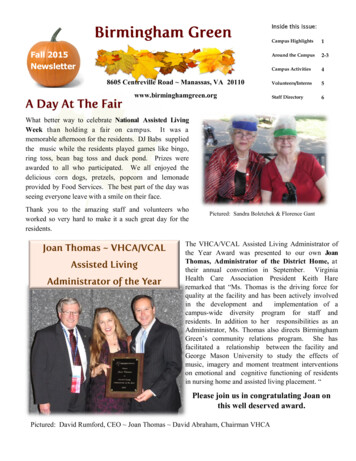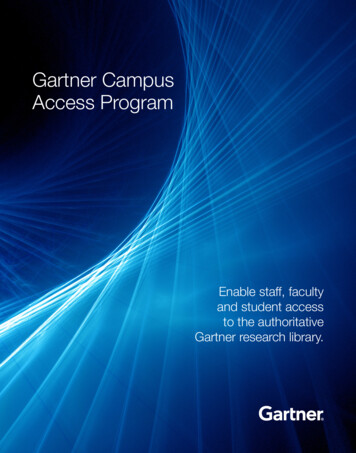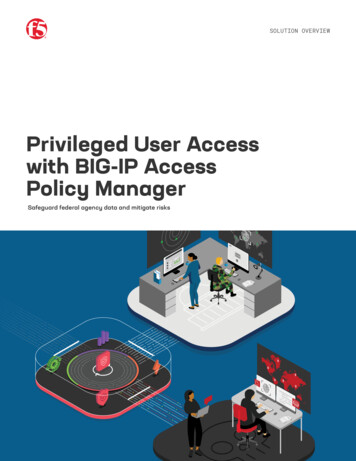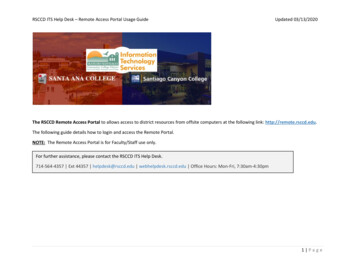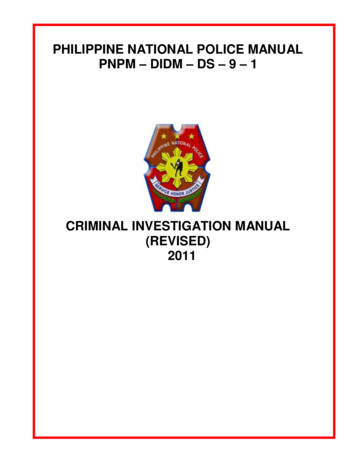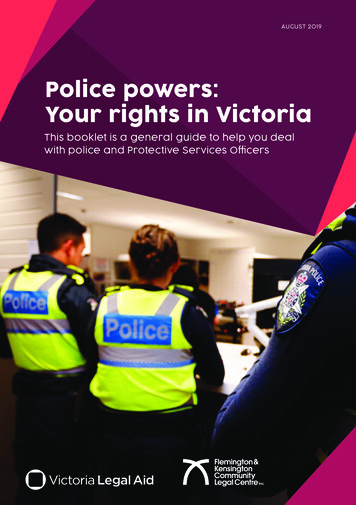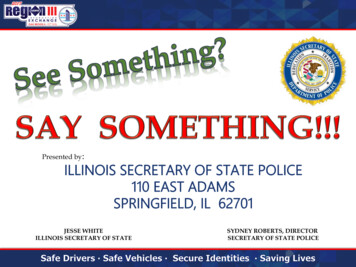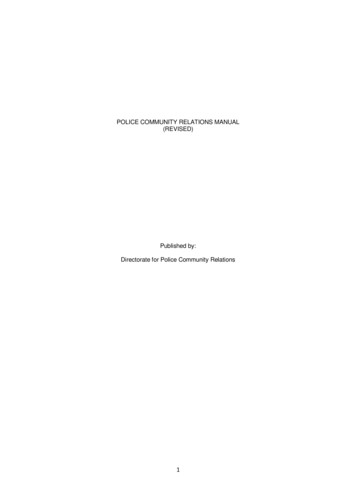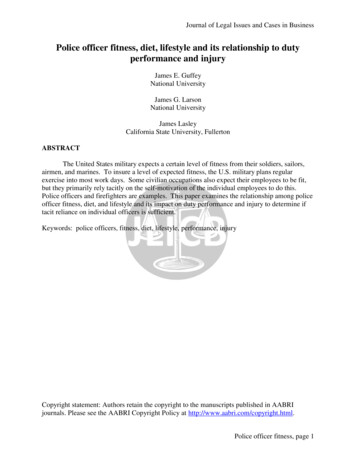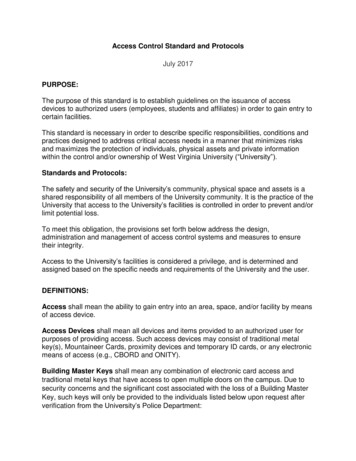
Transcription
Access Control Standard and ProtocolsJuly 2017PURPOSE:The purpose of this standard is to establish guidelines on the issuance of accessdevices to authorized users (employees, students and affiliates) in order to gain entry tocertain facilities.This standard is necessary in order to describe specific responsibilities, conditions andpractices designed to address critical access needs in a manner that minimizes risksand maximizes the protection of individuals, physical assets and private informationwithin the control and/or ownership of West Virginia University (“University”).Standards and Protocols:The safety and security of the University’s community, physical space and assets is ashared responsibility of all members of the University community. It is the practice of theUniversity that access to the University’s facilities is controlled in order to prevent and/orlimit potential loss.To meet this obligation, the provisions set forth below address the design,administration and management of access control systems and measures to ensuretheir integrity.Access to the University’s facilities is considered a privilege, and is determined andassigned based on the specific needs and requirements of the University and the user.DEFINITIONS:Access shall mean the ability to gain entry into an area, space, and/or facility by meansof access device.Access Devices shall mean all devices and items provided to an authorized user forpurposes of providing access. Such access devices may consist of traditional metalkey(s), Mountaineer Cards, proximity devices and temporary ID cards, or any electronicmeans of access (e.g., CBORD and ONITY).Building Master Keys shall mean any combination of electronic card access andtraditional metal keys that have access to open multiple doors on the campus. Due tosecurity concerns and the significant cost associated with the loss of a Building MasterKey, such keys will only be provided to the individuals listed below upon request afterverification from the University’s Police Department:
(1) Deans of Schools(2) Chief Administrators (for control of specific areas of responsibility)(3) Facilities Management Personnel(4) Others may be approved in consultation with UPD.CBORD shall mean the electronic access technology that allows authorized users touse a Mountaineer Card as the means of gaining access. CBORD replaces traditionalkeys with an electronic card reader that is networked into the current Informationtechnology infrastructure to allow for remote communication. The electronic accessreaders can be horizontally or vertically swiped. Current standards indicate that CBORDlocks are to be used on perimeter doors and in interior spaces where applicable due tohigh turnover volume, security concerns, main entry to suites and possibly otherconditions.Other Electronic Devices shall mean the electronic locks used to secure interior roomsand facilities, such as mechanical rooms, offices, and other interior spaces that do nothave direct access to the building’s exterior. The specific systems are very much like ahotel access lock, they are a stand-alone device, offline lock, and unlike CBORD, theyonly have the capabilities of being programmed locally at the lock with a hand heldprogrammer, and cannot provide remote lockdown. This style of offline electronic lockstores all access history and is maintained in the lock’s memory that requires periodicvisits to download/upload information and for battery replacement. This type of device isnot designed, nor permitted for installation at doors leading to a building’s exterior.Department Master Keys shall mean any combination of electronic card access andtraditional metal keys that have access to multiple doors within a specific office suite ordepartment space on the campus. Due to security concerns and the significant costassociated with the loss of a Department Master Key, such keys are only distributed toindividuals specified by the Department Head, or a Chief Administrator, and must beapproved by the assigned department building supervisor.Great Grand Master Key shall mean any combination of electronic card access andtraditional metal keys that have access to open ALL doors and entry points on thecampus. Due to security concerns and the significant cost associated with the loss of aGreat Grand Master key, such keys shall only be provided to the individuals listed belowupon request after verification from University’s Police Department:(UPD and Facilities Recommends NOT Issuing a Great Grand Master to Anyone)(1) President of the University(2) Provost of the University(3) Vice President(4) Associate Vice President, Facilities and Services(5) Chief of Police and delegates(6) Facilities Management Personnel(7) Access control technicians (i.e., Locksmiths)
Suite Master Keys shall mean any combination of electronic card access andtraditional metal keys that have access to multiple doors within a specific office suite ordepartment space on the campus. Due to security concerns and the significant costassociated with the loss of an Suite Master Key, such keys are only distributed toindividuals specified by a Dean of a College or School, a Chief Administrator, orFacilities Management, and must be approved by the assigned department buildingsupervisor.Sub Master Keys shall mean any combination of electronic card access and traditionalmetal keys that have access to multiple doors on a floor on the campus. Due to securityconcerns and the significant cost associated with the loss of an Sub Master Key, suchkeys are only distributed to individuals specified by a Dean of a College or School, aChief Administrator, or Facilities Management and must be approved by the assigneddepartment building supervisor.Residence Keys shall mean any combination of electronic card access and traditionalmetal keys that have access to doors within a student’s assigned living area on thecampus. Students are only issued access for the building in which they reside andMountaineer Cards will register invalid when used in another residential building.Residence Keys are only distributed to the Residential Life Office for issuance to astudent, and must be approved by the assigned department liaison.Employee shall mean all full-time and part-time faculty and staff members,temporary/casual workers, as well as workers employed on a per diem basis, andstudent employees.Student shall mean all person registered for one or more classes at WVU, including online classes.Affiliates shall mean non-employee members and non-students of the universitycommunity that include but are not limited to: vendors, volunteers, observers, trustees,members of the citizens’ board, dependents of employees, retirees, emeriti faculty,alumni, summer scholars, summer campers, Wellness center members, tenants (nonWVU staff) renting space in a University owned buildings and our private partnerships.KEY Control Manager- The individual appointed by the senior buildingadministrator to manage the building access system, usually this is the buildingsupervisor.Power users shall mean those Building Supervisors and/or Building Administrators whohave the ability to provide access to their respective building(s). The designation ofpower users is based upon the volume of programming changes and building use.
Security Levels Defined:Level 1 - "Basic Security": These areas are typically unlocked during business hours,allowing access by University personnel or the general public. After hours these areasare secured and access is by key or card access. University support units, such ascustodians may have access to these areas.Level 2 - "Enhanced Security": Areas that are mechanically and electronically lockedat all times, including during normal business hours, require key or card access to gainentry each time. University support units may have access to these areas. SecuritySystems are also integrated into this program and may be required to be armed anddisarmed by authorized personnel, as necessary, to maintain the desire level ofsecurity.Level 3 - "High-Risk Security": Areas that based on grant, research, and risk asdetermined by UPD or by federal, state, or local laws or code have restricted access, orare restricted by University policies and/or procedures. These areas may require highersecurity access control devices such as biometric control devices. In some casesaccess by University support services may be restricted or limited and may require thatsupport services be escorted by approved department personnel. Security Systems arealso integrated into this program and may be required to be armed and disarmed byauthorized personnel, as necessary, to maintain the desire level of security.Procedure for Mechanical Keys:A. REQUESTS GENERALLY – Basic Security and Enhanced SecurityAll requests for access must be made by designated Building Supervisors to FacilitiesManagement. Once a request is received via a work order, Facilities Management willprocess the request, based upon the type of access requested. A person requestingaccess must meet the applicable criteria as outlined in this section. All areas requesting“high risk security” must have area supervisor and UPD review and approvalGenerally, all routine work, such as the initial installation of access devices,maintenance and repair of access devices will not be considered a billable request.However, in cases where an employee requires access to be reissued due to the loss ortheft of an access device, the costs associated with the new access device will be billedto the requesting department. All non-billable/billable items are subject to review andfinal determination will be made by the Access Control Lead and/or Manager.
B. TYPES OF ACCESS AND CORRESPONDING APPROVALFaculty/staff, students and affiliates may require different types of access. There will befour (4) types of access requests. Each type of request has corresponding approvalprocess, determined by the level of risk and exposure to the University in granting theaccess. It is the responsibility of all users to abide by this standard and to adhere to thelevels of approval outlined below when providing access to an employee, temporaryemployee or casual worker.1. LEVEL 1 ACCESS – Security Level 1Requests at this level seek access to a single door. Such a request is considered themost basic type of access request, and only requires approval from building supervisor.2. LEVEL 2 ACCESS – Security Level 1Requests at this level seek access to multiple interior doors with a department, andaccess to doors leading to the exterior of the building during normal business hours(7:00 am to 7:00 pm, Monday through Friday.3. LEVEL 3 ACCESS – Security Level 1Requests at this level seek access to: (I) access to multiple buildings. Such a requestmust be reviewed and approved by all building supervisors impacted before submissionto Facilities Management.4. LEVEL 4 ACCESS – Security Level 2 and 3Requests at this level seek access to restricted or high security areas. Such a requestmust be reviewed and approved by the building administrator or the Chief of Policebefore a work order is issued by FACILITIES MANAGEMENT.NOTE:Electronic Override Access Building Supervisors shall have an electronic override keyto allow emergency access when electronic locks fail.SEPARATION FROM THE UNIVERSITY; INTER-DEPARTMENT TRANSFERS;LEAVES OF ABSENCEA. EMPLOYEES1. SEPARATIONWhere an employee is separated from the University, it is the responsibility of theimmediate supervisor or Human Resources representative to collect all Universityowned materials including (metal keys, Mountaineer Card, proximity devices, and
temporary cards) previously issued to an employee. The department liaison will beexpected to: (i) consult with the Key Shop/Access Control Shop to ensure that alldevices are accounted for prior to separation; (ii) initiate a work order for the AccessControl Shop to terminate all access in the system for electronic devices and (iii) submitall collected access devices to Key Shop or Access Control within 24 hours ofcollection, to enable proper and timely deactivation.2. TRANSFERIf an employee is transferring to a new department within the campus, the currentdepartment liaison must submit a request to deactivate the employee’s access.The employee’s current liaison is responsible for collecting any keys issued to theemployee prior to the effective date of the employee’s to another department.Those keys are to be returned to the Lock Shop to properly document the returnof the keys. The liaison in the new department shall be responsible for requestingaccess for the transferring employee in the manner described in Section I above.3. LEAVE OF ABSENCEEmployees who are on a continuous leave of absence or on work-at-homeassignment may be required to submit their access devices to their department liaisonprior to the commencement of their leave/assignment.III. VIOLATIONS of StandardsViolations of this standard may result in the loss of privileges afforded. Employeesdetermined to have violated this standard may be subject to disciplinary action up toand including termination of employment. Violations include, but are not limited to, thefollowing:loaning an access device to another individual;obtaining and issuing an access device without authorization;unauthorized duplication of access devices;damaging, tampering, vandalizing, altering or modifying University access devices,hardware; locks or other access mechanisms;installing or causing to be installed an unauthorized locking mechanism on Universityspaces (e.g., offices, labs, etc.);Propping doors open to avoid the use of access devices;admitting unauthorized person(s) into the building;failing to return an access device when requested by the Access Control Shop, UPD,the issuing department, or upon leaving the employment of the University;failing to report missing access devices;failing to comply with the request and approval provisions set forth in this policy.
key boxes are not typically allowed to be kept within offices and/or departments withUniversity keys. When key boxes are utilized primary records will reflect location and towhom the keys are issued, purpose, and date returned and access must be limited.Manufacture of KeysThe Key/Lock Shop will make all keys once a completed form has been received. Thekey will be issued in the name of the department with the Key Control Manager listed asthe custodian for the key.Primary RecordsThe Key/Lock Shop will maintain the primary records for all keys issued. Records, at aminimum, will include the following information for each key issued: Key NumberBuilding(s)Room(s)DepartmentBuilding SupervisorDateSignature of Building Supervisor receiving keyOn an annual basis, the Key/Lock Shop will prepare a list of those keys issued to alldepartments on campus. This list will be distributed to the Building Supervisor/KeyControl Managers for verification of the records. Any corrections to the primary recordswill be made by the Key/Lock Shop based on the information provided by the BuildingSupervisor/Key Control Managers. While this must be done on an annual basis, anindividual department can request a list of all keys issued in its name at any time.Secondary RecordsEach Building Supervisor will have the responsibility for those keys that have beenissued to a particular building. This responsibility includes proper maintenance of theKey Assignment Forms, which are provided with each key. These forms will allow keysissued to a particular building to be transferred among individuals in that buildingwithout involvement of the Key/Lock Shop and will include the following information: DepartmentKey NumberBuilding(s)Room(s)
Issue DateIssued toIssue dateReceived by building supervisorReturn dateReturned by building supervisorThese records or their computerized adaptation will be subject to review by the InternalAudit Department during both routine and surprise audits of departmental procedures.Return of Campus KeysBuilding Supervisors are responsible for collecting keys from individuals upon theirdeparture from the University. Excess keys should be monitored and returned to theKey/Lock Shop when no longer needed. Excess and unnecessary keys in circulationcreate a security risk to the individual departments.Lost Keys/Access DevicesIn the event that a key is lost, the building supervisor should report the loss immediatelyto the Key/Lock Shop. The building supervisor must make individuals in his/her buildingaware that lost keys should be reported immediately. To obtain a replacement key, anew Key Request/Record Form must be completed. There may be a charge for lostkeys.Worn, Damaged, or Broken Key ReplacementA replacement for a worn or broken key will be provided by exchange for the defectivekey. The building supervisor should simply notify the Key/Lock Shop of the problemand turn in the defective key when picking up the replacement. Normally, at no charge.Key/Access Device DuplicationIt is strictly prohibited to attempt to have any University key duplicated by anyone otherthan the University lock shop.Building Use Keys/Access DevicesGroups of keys may be provided to a building supervisor for local issue to students andother temporary uses provided the building supervisor supplies Facilities ManagementDepartment with evidence of an acceptable key record/retrieval system in the form of a
written procedure. Keys are to be requested using the standard Key Request/RecordForm or a work order. The name on the request should be the administrativedepartment and the card must be signed and approved by the appropriate buildingsupervisor or higher.The building supervisor is responsible for individual record keeping of the issued keys.Their records plus keys on hand should always match the record of the number of keysissued by Facilities Management Department.Procedures for Mountaineer Card Access SystemIssuing Access CardsAll WVU Cards will be issued by the Information Technology Services, HumanResources, Health Science Center, and Regional Campuses.Employees/AffiliatesOnce the Cbord system has the employment information for an employee includingdepartmental name a card of the correct design can be printed by a card productionoffice.StudentsOnce the CBord system has current registration information, current housinginformation, or next semester registration information a Student card can be printed by acard production office.ConferenceParticipants' request for special cards for guests visiting the University as participants inconference programs will be coordinated through the Information Technology Services.Building AccessEmployeesAll requests for access for an employee require that the employee have an employeeWVU ID number and a Mountaineer Card. Once an employee receives theiridentification number and Mountaineer Card through Human Resources, the employee’sdepartmental liaison must submit a request to the building supervisor to activateinterior/exterior access.
Facilities Management PersonnelAll access request for electronic entry for Facilities Management Personnel shall berequested by the employee’s Manager via work order to the WVU Lock Shop.StudentsThe University’s Office of Enrollment Management is responsible for entering the newstudent’s information into the University’s system. The CSGOLD system downloadsnew information from the University’s registration system every night. Oncedownloading is completed, a new student’s card is updated with access to theirresidence hall building, libraries, pool, and other common areas on the campus.The University’s Office of Housing and Residential Life is responsible for providingaccess to residential students for their particular living areas. Residential students willonly be granted access to their assigned living spaces and their Mountaineer Cards willregister invalid if a student attempts to enter a different residential buil
CBORD shall mean the electronic access technology that allows authorized users to use a Mountaineer Card as the means of gaining access. CBORD replaces traditional keys with an electronic card reader that is networked into the current Information technology infrastructure to allow for rem
